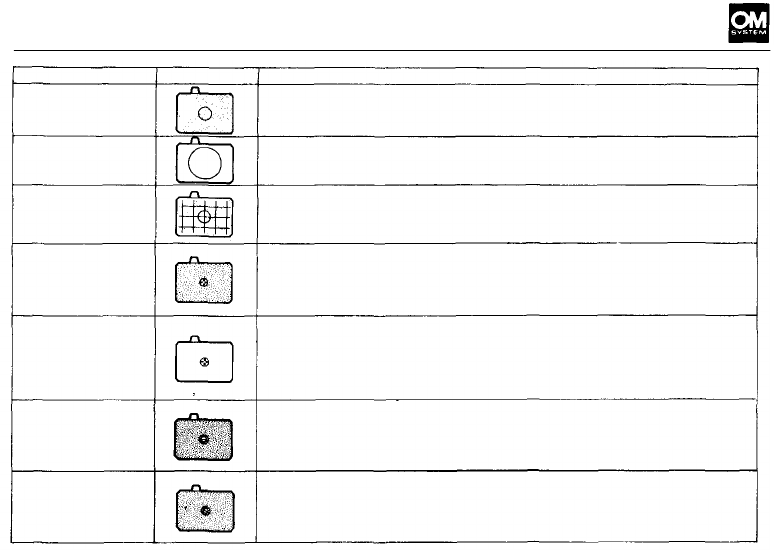
TYPE
1-8
All matte type
(for telephoto lenses &
astronomical telescopes)
1-9
Clear field type
(for endoscopic
photography)
1-10
Checker-matte
type
(for Shift lens)
1-11
Cross hairs-matte
type
(for close-up &
macro-
photography)
1-12
Cross hairs-clear
field type
(for photomicrography
& macrophotography
greater
than
life
size)
1-13
Microprism/split
image-matte
(for most lenses)
1-14
Microprism/split
image-matte
type
(for most lenses)
SCREEN
FEATURES
This
screen
is
ideal
for use
with
super
telephoto
tenses
of
300mm
or
more in focal length, or for astrophotography. The extreme fineness
of the matte surface permits outstanding field definition. More accu-
rate focusing may be achieved by the use of the Varimagni Finder.
Designed for use with OLYMPUS fiberoptic endoscopes. This con-
denser type screen without fresnel lens requires no focusing when
a special adapter couples the camera with the fiberscope. Exposure
is made automatically by the light supply.
The grid lines engraved on the all-matte surface are used for vertical
and horizontal picture alignment. Though originally designed for
architectural
photography
with
the
Shift
lens,
it is
also
suitable
for
general and super-telephotography, and close-up/macrophotography
with
macro
lenses
and
Auto
Bellows.
Highly advantageous for close-up and macrophotography with Auto
Bellows and extension tubes. For focusing in low magnification close-
up photography, use the matte area and in macrophotography greater
than life size, use the double cross hairs the same way as with the 1 -1 2.
The meter needle indicates proper exposures, but depending on the
conditions of the specimen, the reading must be compensated for.
The
transparent
screen
offers
the
photographer
focusing
with
an un-
usually bright finder image. To focus, first correct your diopter
using a dioptric correction lens or Varimag ni Finder so that each
line of the double cross hairs can be seen clearly and separately.
Then bring the specimen into focus. The meter needle indicates
proper exposures, but depending on the specimen's conditions, the
reading must be compensated for.
Most
suitable
for
normal photography,
this
screen
assures
pinpoint
focusing. The central split image rangefinder is encircled by a micro-
prism collar. Since the outer area has a matte surface, the screen can
be used in the same way as the standard 1-1 and 1-3 Screens. When a
lens with a maximum speed of F5.6 or slower is used, the prisms
darken and the focusing must be made on the matte area.
Most suitable for normal photography. The central split-image range
finder, encircled by a microprism collar, is inclined 45 degrees to allow
easy
focusing
on
subjects
with
vertical
or
horizontal
lines.
When
a
lens with a maximum speed of F5.6 or slower is used, the prisms
darken and focusing must be made on the matte area. The meter
needle gives correct light readings.
60
type


















